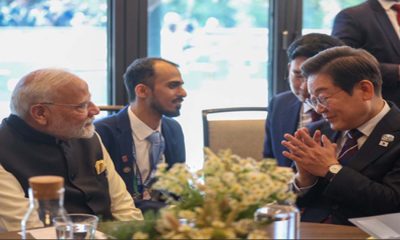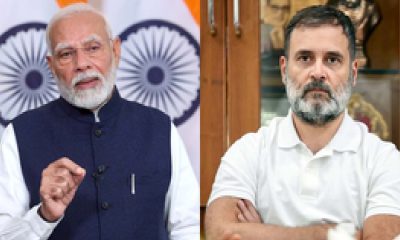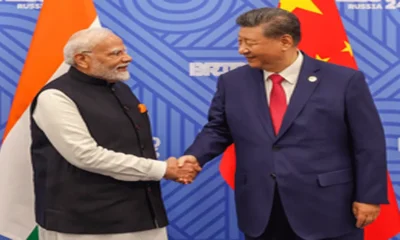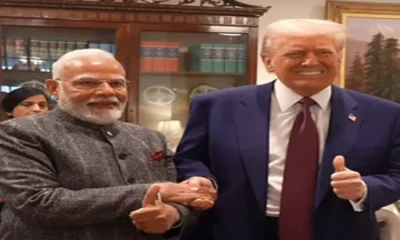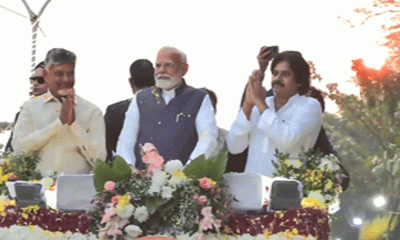Politics
Connectivity speed will determine growth of country: PM Modi
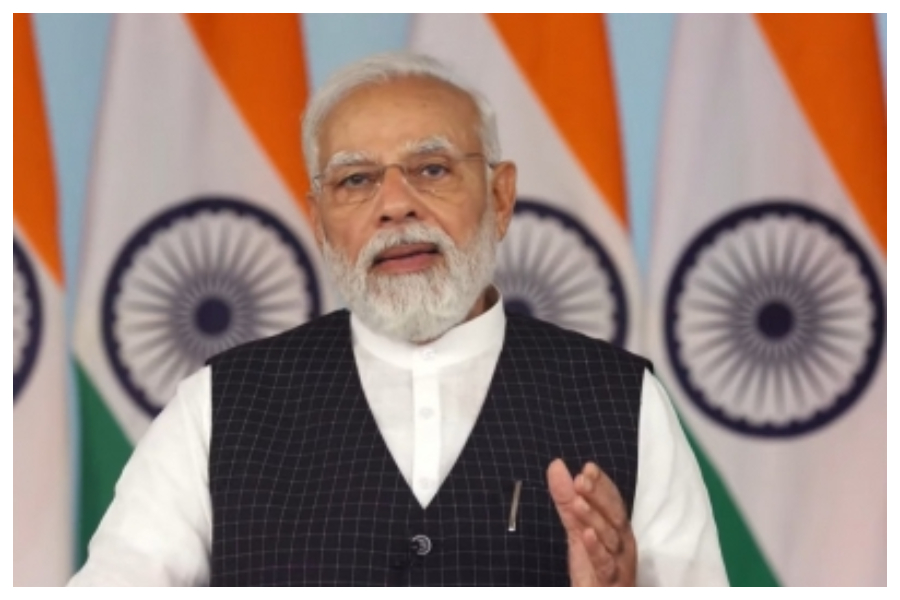
Prime Minister Narendra Modi on Tuesday said that the connectivity speed will now determine the growth and development of the country.
At an event organised by the Ministry of Communication to mark the silver jubilee of the Telecom Regulatory Authority of India (TRAI), he launched the 5G test bed. TRAI is celebrating its foundation day when the country is also planning the growth for the next 25 years under the ‘Azadi Ka Amrit Mahotsav’, he said.
Expressing his happiness over the launch of 5Gi, he said that it will set its own standard of 5G in India.
Noting that the 5G technology will facilitate governance and make a positive change in ease of doing business in many fields, Prime Minister Modi said that it will create more jobs in many sectors.
The 6G service, he said, will be launched by the end of this decade, adding that a taskforce has already started working on the project.
Referring to the 2G period, he said: “It was full of frustration, corruption and policy paralysis but after that we came to 3G, 4G and now we are testing the 5G technology, developed by the Communication Ministry, Indian Institute of Technology at Chennai and Delhi”.
Noting that the Telecom sector is one of the finest examples of self-reliance, PM Modi also said that one-and-a-half times more foreign investments has come in the last eight years in comparison to total investment till 2014.
“Today, we are the fastest growing country using mobile and internet and mobile phone manufacturing. We had only two companies producing mobile phones but now there are over 200 mobile companies who are manufacturing mobile sets for our domestic needs but we are also exporting to other countries,” Modi said.
He also said that in 2014, the government initiated ‘Sabka Saath, Sabka Vikas’ and wanted to get the people connected with the government sponsored programme at the minimum cost and “we initiate the connecting the Jan Dhan account, Aadhar card” with mobile to get the direct benefit schemes.
“To keep the call and internet data rate cheaper, we initiated policies in the telecom sector and made it competitive and healthy and this is why the calls and internet data both are quite cheap in India,” PM Modi said.
He also informed that over 1,75 lakh Gram Panchayats are connected with the broadband facility and gave approval of the 4G network by BSNL in Naxal-affected areas.
PM Modi also urged all the regulators of this sector to make a common platform to find out best solutions for the telecom industry in days to come.
Maharashtra
Pune Zubair Hangekar’s Pakistan connection, hope for new conclusions in the investigation… ATS releases him after questioning 19 people so far
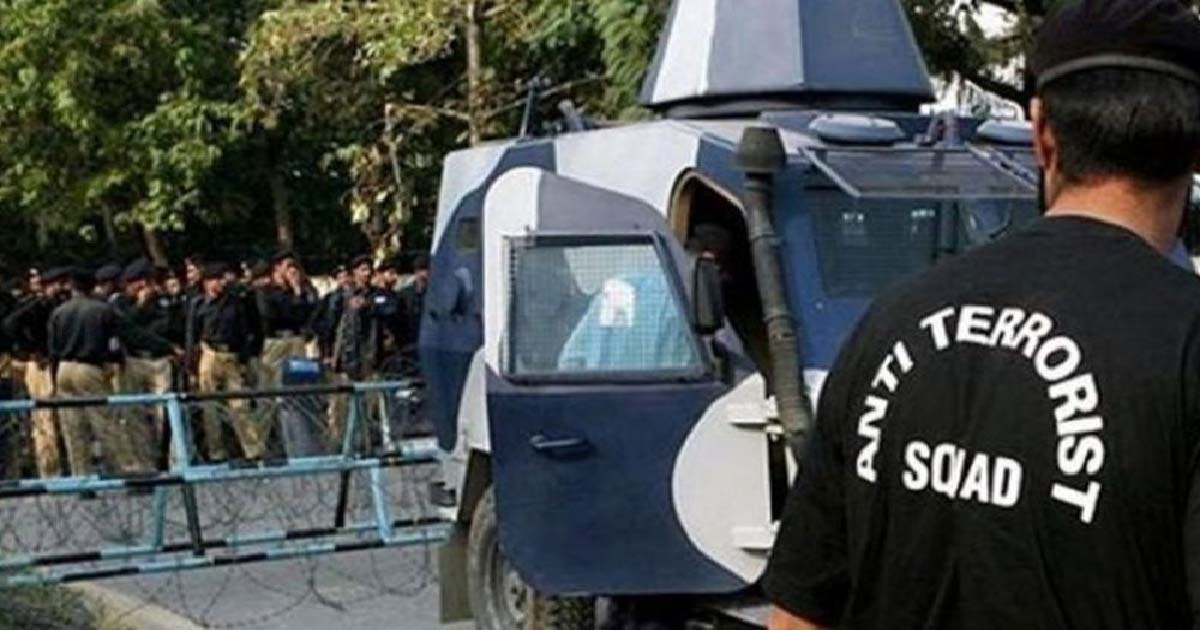
Mumbai: Pune Suspected terrorist Zubair Hungakar’s contact list has Pakistani numbers. Zubair Hungakar’s mobile contact list has 5 international numbers. Numbers of Gulf countries were found in Hungakar’s old and used handset. The old handset has 1 number for Pakistan, 2 for Saudi Arabia, 1 number for Oman and 1 number for Kuwait. It has been found that 1 Omani and 4 Saudi Arabian numbers are stored in the mobile phone used.
When asked about this number, Zubair said in response to a question during interrogation that he did not know. Suspected Al-Qaeda member Zubair Hungakar has been sent to judicial custody. Zubair Ilyas Hungakar was arrested on charges of spreading jihad in support of the terrorist organization Al-Qaeda in the Indian subcontinent and threatening the unity and security of the country.
Zubair is originally from Solapur and currently works in a software company in Kalyani Nagar. He is married and has two children, and his family resides in the Kondwa area. Meanwhile, the ATS is thoroughly investigating the matter and is investigating whether Zubair had any links with Al-Qaeda members, why he had these materials and for what purpose. The police will also question his friend and examine his mobile and other electronic devices. It is also being investigated whether he was in contact with any other terrorist organisation. All these international numbers are important to Zubair and it is being speculated that he has terrorist connections and links. However, when questioned about these numbers, he gave vague answers that he did not know who they belonged to or what they were related to.
ATS officials said that investigations are being conducted to find out whether Zubair had any links with Al-Qaeda members and what was the purpose of this contact. We are also investigating why and for what purpose he had the Al-Qaeda material. His friend in his custody will be questioned and his mobile and other electronic devices will also be examined. It is also being investigated whether he came in contact with any other terrorist or not. Meanwhile, the ATS had earlier this month conducted search operations in different parts of the city. The operation was related to the investigation of an old ISIS module. At that time, suspected radical individuals were kept under surveillance. During this operation, 19 people were detained for questioning, but they were released after questioning. During these raids, the police have also seized some important documents along with electronic devices.
Crime
Mumbai Police detain three linked to Delhi blast accused
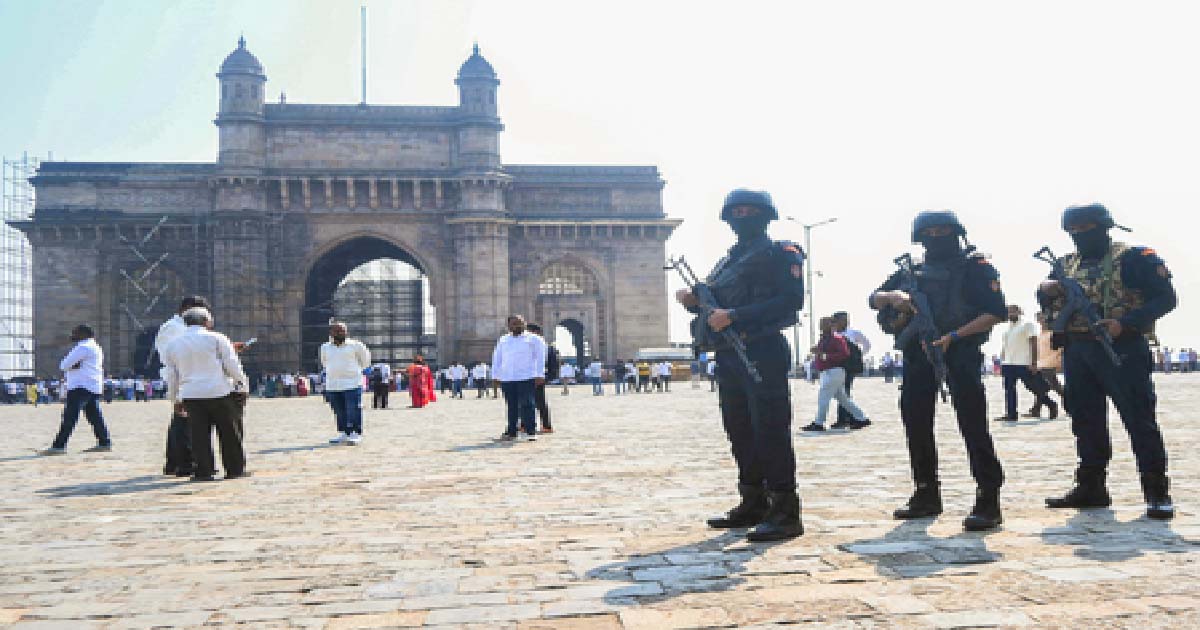
Mumbai, Nov 18: The Mumbai Police have detained three individuals linked to the accused in the Delhi car blast attack case, officials said on Tuesday. They are now being sent to Delhi for further interrogration.
These three individuals were detained from different locations in a secret operation carried out by a special team of the Mumbai Police and are currently being questioned.
According to the officials, the detained people were in contact with the accused through a social media application.
The police have also mentioned that these people are from well-to-do families, just like Dr Umar Muhammad and Dr Muzammil, two key accused in the terror module linked to the Delhi blast.
Similar investigations are being conducted in various districts across the state, officials.
Earlier on Monday, sources said that investigators have found encrypted conversations and the movement of weapons has revealed a tightly organised inner circle within the terror module linked to Dr Umar Muhammad, the driver of the i20 car that exploded near Delhi’s Red Fort, killing at least 13 and injuring over a dozen people.
According to official sources, Umar created an encrypted Signal group nearly three months ago, using a name marked with special characters to avoid surveillance.
He reportedly added Muzammil, Adil Rather, Muzaffar Rather and Maulvi Irfan Ahmad Waghe to this channel, which functioned as the primary hub for internal coordination.
A major turning point in the probe came after an assault rifle and a pistol were recovered from the car of Dr Shaheen Shahid. Investigators believe Umar had procured these weapons and handed them to Irfan sometime in 2024.
Shaheen had previously seen the same weapons during a visit to Irfan’s room along with Muzammil, and is suspected to have contributed the largest share of funds used to sustain the module’s operations.
Sources said the evidence so far points to a clear hierarchy and division of roles. Financial support was primarily managed by the three doctors, with Dr Muzammil playing a central role.
Recruitment of Kashmiri youths was handled by Irfan, who is believed to have brought in two arrested recruits — Arif Nisar Dar alias Sahil and Yasir ul Ashraf.
Investigators have also documented several instances of weapon movement. In October 2023, Adil and Umar visited Irfan at a Kashmir mosque, carrying a rifle hidden in a bag, and later left after cleaning its barrel.
A month later, Adil again arrived at Irfan’s residence with a rifle. Muzammil and Shaheen also reached the location that same day. The weapon was reportedly kept with Irfan, and Adil returned the next morning to collect it, sources said.
The findings indicate a coordinated network operating through encrypted platforms, involving systematic fundraising, targeted recruitment and careful handling of weapons, they added.
The network is linked to the Faridabad terror module, which was exposed on November 9 after police seized 2,900 kg of explosives and ammunition from rented rooms linked to Muzammil, a doctor associated with the Al Falah University.
Umar, another doctor associated with Al Falah University, was driving the car that exploded near the Red Fort on November 10, triggering a massive investigation into the module’s operations. Police have since intensified the hunt for all individuals connected to the network.
Further investigations are underway.
Crime
K’taka HM vows swift action after techie loses Rs 31.83 crore in ‘digital arrest’ scam
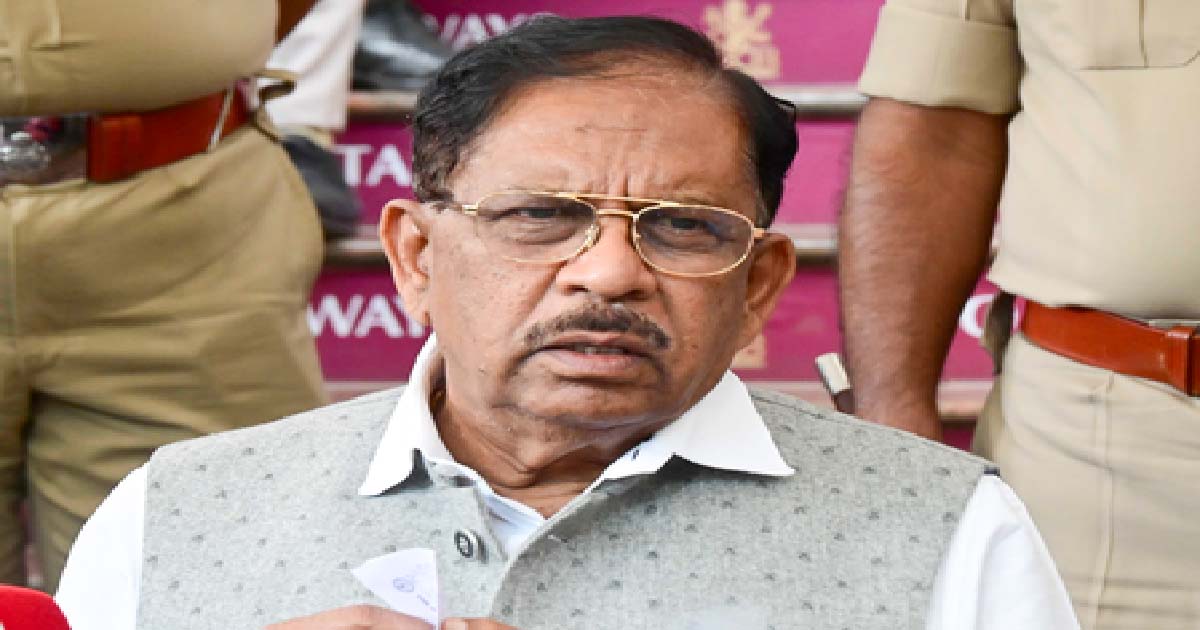
Bengaluru, Nov 18: Karnataka Home Minister G. Parameshwara on Tuesday said the government would take firm action in the online fraud case involving the “digital arrest” of a 57-year-old Bengaluru tech professional who lost Rs 31.83 crore.
He confirmed that it is the largest online financial scam reported in Karnataka to date, adding that the people behind the digital arrest would not be spared.
Speaking to reporters, Parameshwara said that the fraud took place over more than a year, involving about 187 transactions from the victim’s account. “She could have approached the police at any stage, and had she done so earlier, she would not have lost such a large amount,” he said.
He said the state had not witnessed a digital arrest case of this scale earlier. “We are treating the case with full seriousness and will trace those responsible,” he said.
“If she realised the fraud only after transferring money amounting to crores, it shows how deeply she was affected by the scam. Now that the case has come to light, we have taken it seriously. This is the highest-ever online fraud reported from our state. This is the first time such a large-scale digital arrest case has been reported and such a huge amount siphoned off,” Parameshwara said.
The Karnataka Home Minister also referred to a separate case in which people based in Karnataka had virtually detained individuals in the United States, pointing out that the method was not new to local investigators.
The incident came to light on Monday, when it was reported that a 57-year-old Bengaluru tech professional had lost Rs 31.83 crore to cybercriminals after being held in a digital arrest for more than six months.
Following a complaint at Bengaluru’s East Cyber Crime Police Station, the police launched a hunt to trace the gang.
The victim transferred Rs 31.83 crore in 187 transactions, exhausting nearly all her savings and deposits except her fixed deposits. The accused repeatedly assured her that the money would be returned by February after verification but kept delaying the deadline with one excuse after another.
Growing suspicious, the victim lodged a complaint with the cybercrime police on November 14. In the complaint, she stated that due to her son’s marriage ceremony, she could not approach the police early.
According to the police, the cybercriminals kept the victim under digital arrest for more than six months and severed contact after extorting the amount.
Her ordeal began on September 15, 2024, when she received a call from someone claiming to represent a reputed courier company, who told her that a package in her name — containing three credit cards, four passports, and banned MDMA — had been received at a courier centre in Andheri, Mumbai.
The victim told the caller that she lived in Bengaluru and had no knowledge of the package. He then warned her that, since the parcel was linked to her mobile number, it could involve cyber fraud and she needed to file a complaint. Before she could respond, her call was transferred to another person claiming to be an officer from the Central Bureau of Investigation (CBI).
The accused prevented her from contacting the police or seeking legal help by convincing her that cybercriminals were monitoring her every move. They later issued direct threats, warning that if she revealed anything, her entire family would be implicated.
With her son’s wedding approaching, she yielded to the pressure and followed their instructions. The accused then contacted her via Skype, identifying himself as Pradeep Singh, and informed her that another associate, Rahul Yadav, would monitor her for a week. During this period, she was confined to her home, while the accused worked remotely from her residence.
On September 23 last year, the accused instructed the victim to declare her properties to the Reserve Bank of India’s Financial Intelligence Unit (FIU). After she disclosed her assets and cash, they extorted money from her in stages and even provided a forged clearance certificate.
The police said that the investigation is underway.
-

 Crime3 years ago
Crime3 years agoClass 10 student jumps to death in Jaipur
-

 Maharashtra1 year ago
Maharashtra1 year agoMumbai Local Train Update: Central Railway’s New Timetable Comes Into Effect; Check Full List Of Revised Timings & Stations
-

 Maharashtra1 year ago
Maharashtra1 year agoMumbai To Go Toll-Free Tonight! Maharashtra Govt Announces Complete Toll Waiver For Light Motor Vehicles At All 5 Entry Points Of City
-

 Maharashtra1 year ago
Maharashtra1 year agoFalse photo of Imtiaz Jaleel’s rally, exposing the fooling conspiracy
-

 National News1 year ago
National News1 year agoMinistry of Railways rolls out Special Drive 4.0 with focus on digitisation, cleanliness, inclusiveness and grievance redressal
-

 Maharashtra1 year ago
Maharashtra1 year agoMaharashtra Elections 2024: Mumbai Metro & BEST Services Extended Till Midnight On Voting Day
-

 National News1 year ago
National News1 year agoJ&K: 4 Jawans Killed, 28 Injured After Bus Carrying BSF Personnel For Poll Duty Falls Into Gorge In Budgam; Terrifying Visuals Surface
-

 Crime1 year ago
Crime1 year agoBaba Siddique Murder: Mumbai Police Unable To Get Lawrence Bishnoi Custody Due To Home Ministry Order, Says Report



